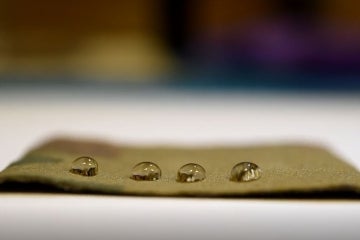U of T thinkers deliver big ideas at TEDx Toronto

Published: October 28, 2016
When U of T undergrad Calvin Rieder was just a kid, he went camping with his family. During the night, dew condensed on the inside of his tent, rolled down the fabric wall and made his pillow wet.
To most, this event would mean minor discomfort. But to Rieder, that tiny rivulet of water inspired a design for an atmospheric water condenser – a portable device that pulls clean, drinkable water out of thin air.
Since waking up that morning in his tent, Rieder’s passion for developing sustainable solutions to address the urgent need for clean, potable water in developing nations has led him to become a member of the World Youth Parliament for Water, and was recently named in Plan Canada’s Top 20 Under 20. Now, his drive to promote universal access to clean water has put him centre stage on the famous TEDxToronto red carpet.
“We have to make changes that have sustainable impact — if we don’t, we won’t survive,” he told an audience of more than 1,000 attendees at the October 26 event, organized on the theme of ‘Symbols + Signals’. “I wanted to get clean water to where it’s needed, with no negative impact on the environment.
“I didn’t want to create one problem while trying to solve another, so I thought about three things: accessibility, affordability and sustainability.”
The first morning he went to check on his prototype, he was thrilled by the macabre scene: “The collecting basin was full of drowned flies, and I was delighted that there was enough water in there to do that.”
Read more about Rieder in The Toronto Star
Today, Rieder is a second-year engineering student in the department of mechanical and industrial engineering, where he's also working on a solar-powered still that purifies dirty water of both physical and bacterial contaminants. His vision is not only to supply drinkable water to rural, remote and developing nations where water treatment infrastructure is scarce or nonexistent, but to supplement overtaxed urban water resources.
Rieder was one of 18 thinkers, artists, researchers and inventors invited to speak and perform at TEDxToronto, an independently organized event dedicated to the core TED concept of sharing “ideas worth spreading.”
Besides Rieder, six other University of Toronto professors, researchers and alumni shared their unforgettable ideas from the big red carpet.
Aled Edwards, professor in the department of molecular genetics, on the importance of open science:
“Much of Canadian science, indeed much of global science, is redundant… I’m an irrelevant cog in the machine. Imagine if we could use our resources more efficiently – we’d see massive global benefit.”
Nick Saul, alumnus, on our misguided food charity ecosystem:
“We have to find a way to recognize that when people are struggling, it’s not because they don’t have enough to eat. At the root of hunger is poverty… what’s needed is not charity, but solidarity.”
Marcel Danesi, professor in the department of anthropology at the Faculty of Arts & Science, on the significance of emojis to the evolution of human language:
“When we’re communicating informally, and even not so informally, we need to feel as well as think.”
Ryan Janzen, PhD candidate in The Edward S. Rogers Sr. Department of Electrical & Computer Engineering, on engineering transportation systems that redesign our world:
“Romans built the aqueducts. What can our civilization create or build that will last? What be our aqueducts, for generations to come?”
Sarah Barmak, alumna, on pervasive misunderstanding of female anatomy and sexuality:
“Female sexuality can’t be fixed with a pill. That’s because it’s not broken – it’s misunderstood. If more than half of women have some kind of sexual dysfunction, maybe it’s our understanding of female sexuality that’s broken.”
Helene Polatajko, professor in the department of occupational science and occupational therapy in the Faculty of Medicine, on helping patients learn to overcome inabilities, rather than correcting what were perceived as errors:
“It was heretical at the time… We asked ‘What are they doing differently?’ not ‘What are they doing wrong?’ – different and wrong are not the same thing.”



